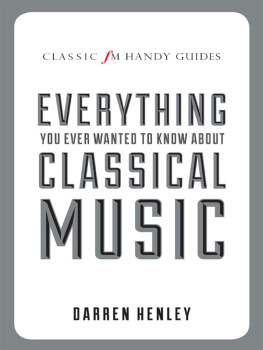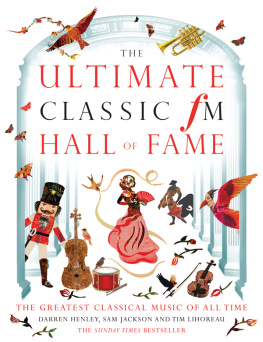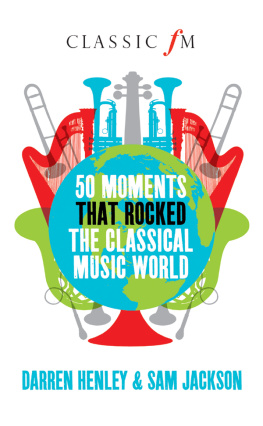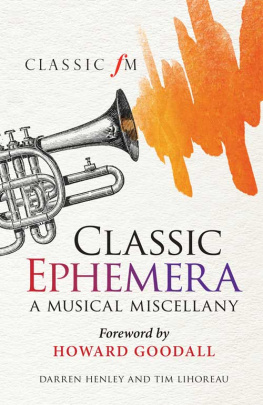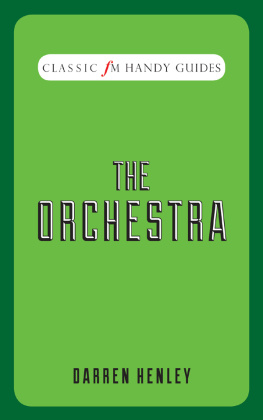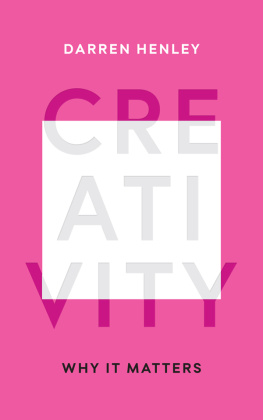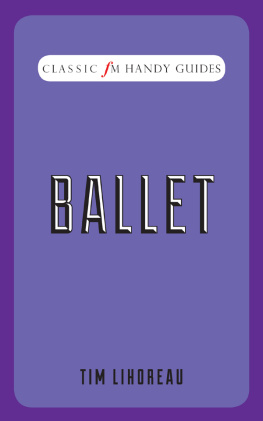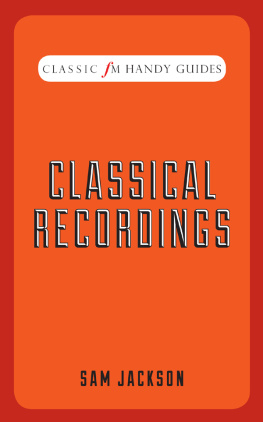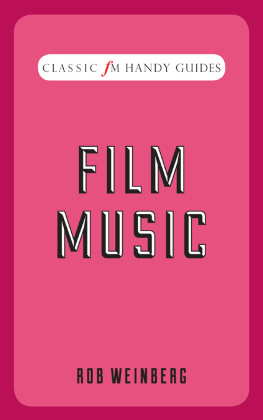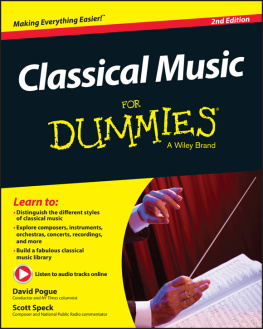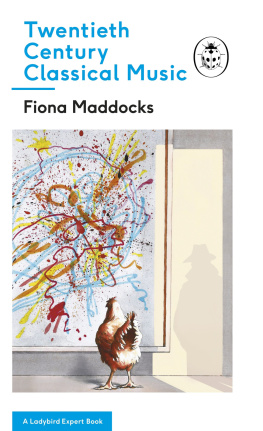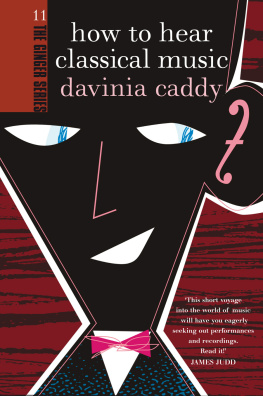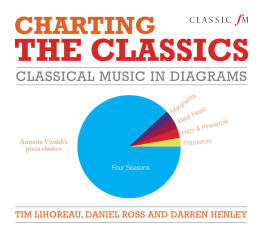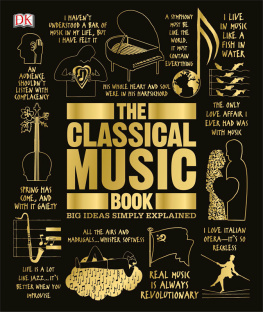

For Izzy, who turned out to be rather
good at this music thing.
Contents
About the Author
Introduction
A t Classic FM, we spend a lot of our time dreaming up wonderful ways of making sure that as many people as possible across the UK have the opportunity to listen to classical music. As the nations biggest classical music radio station, we feel that we have a responsibility to share the worlds greatest music as widely as we can.
Over the years, we have written a variety of classical music books in all sorts of shapes and sizes. But we have never pulled together a series of books quite like this.
This set of books covers a whole range of aspects of classical music. They are all written in Classic FMs friendly, accessible style and you can rest assured that they are packed full of facts about classical music. Read separately, each book gives you a handy snapshot of a particular subject area. Added together, the series combines to offer a more detailed insight into the full story of classical music. Along the way, we shall be paying particular attention to some of the key composers whose music we play most often on the radio station, as well as examining many of classical musics sub genres.
This particular book is rather longer than those that make up the rest of the series, providing you with a pocket-sized overview of classical music. However, it is still relatively small in size, so it is not going to be encyclopedic in its level of detail; there are other books out there that do that much better than we could ever hope to. We have included a list of them in the chapter entitled Where To Find Out More towards the end of this book.
Instead, our series of Classic FM Handy Guides is intended to form an enjoyable introduction that will be particularly useful to listeners who are beginning their voyage of discovery through the rich and exciting world of classical music. Drawing on the research and previous writing we have undertaken for many of our other Classic FM books, such as The AZ of Classic FM Music, The Classic FM Friendly Guide to Music and Everything You Ever Wanted to Know About Classical Music... But Were Too Afraid to Ask, this particular title concentrates on information rather than theory because we want to make it attractive and inviting to readers who are not necessarily familiar with the more complex aspects of musicology.
For more information on this series, take a look at our website: www.ClassicFM.com/handyguides.
Preface
T his book is a revised edition of Classic FMs popular Everything You Ever Wanted to Know About Classical Music... But Were Too Afraid to Ask, originally published in 2012. This new edition has been both condensed to focus on the history of classical music and updated to include a wider range of composers.
We are often asked the question What exactly is classical music? It is probably something we ought to tackle before getting going on our journey through the genres history.
The strictest definition of classical music is everything that was written in the Classical period (between 1750 and 1830), but today we understand classical music to be much more than music composed in just those eighty years.
Calling a piece of music classical is sometimes done as a means of generically distinguishing it from popular music. One of the major tests of whether a tune is or isnt classical music has traditionally been whether it has a sense of permanence about it, in that it is still being performed many years after its composition. This argument begins to fall down as the heritage of pop music becomes ever longer, with hits from the 1950s still being played on the radio today, well over half a century after their original release. It is also hard for us to tell whether a newly written piece of classical music will indeed attain a level of permanence in the future.
The Concise Oxford Dictionary of Music offers the following as one of its definitions of classical music: Music of an orderly nature, with qualities of clarity and balance, and emphasising formal beauty rather than emotional expression (which is not to say that emotion is lacking).
It is true to say that much of classical music follows specific rules of style and form, the development of which we will discuss in the chapters that follow. However, this definition still does not quite do the job.
One of the most striking differences between classical and pop music is the different way the two genres place emphasis on the relative importance of the composer and the performer. In pop music the performer is all, but in classical music the composer is the star of the show. It is his or her name that tends to come first in the credits and it is he or she who is remembered by history. Take Mozarts Clarinet Concerto as an example. Not many people remember Anton Stadler, the clarinettist for whom it was written, but everyone knows Mozarts name. Conversely, if you ask most music fans whom they would associate with that hardy perennial White Christmas, they would reply Bing Crosby, rather than the songs composer, Irving Berlin.
At Classic FM, we have long believed that film scores sit firmly inside the world of classical music. The first dedicated soundtrack was composed by Camille Saint-Sans for the 1908 film LAssassinat du duc de Guise. Since then, Aaron Copland, Ralph Vaughan Williams, William Walton, Sergei Prokofiev and Dmitri Shostakovich have all written music for the cinema. If we go back to the time of Beethoven, we find him composing incidental music for the theatre of the day. Had cinema been invented in his lifetime, he would undoubtedly have written this genre of music too.
Today, film soundtracks are among the most popular symphonic works being composed, with pieces by the likes of John Williams, Hans Zimmer, Howard Shore and James Horner providing an excellent gateway into wider listening to classical music.
Throughout classical musics history, composers have always written music for those who pay, whether their patrons were rich noblemen or rich film studios. In the past few years, the more commercial end of classical music has included scores especially written for video games. We will discuss this later in the book, but make no mistake, companies such as EA Games are now among the biggest commissioners of contemporary classical composers and many of our greatest symphony orchestras are earning significant income from recording long-form symphonic works specifically for inclusion as soundtracks on video games. It would be wrong to ignore this pivotal development in the story of classical music, simply because it is commercial in nature and relatively new as a concept.
Whatever the definition of classical music to which you personally subscribe, we think that the great jazz trumpeter Louis Armstrong had things just about right when he said, Theres only two ways to sum up music: either its good or its bad. If its good you dont mess about it you just enjoy it.
We hope you will enjoy uncovering the rich tapestry of sounds, emotions and stories that go together to make up classical music. It is the greatest music ever written. We also hope that you will enjoy the Classic FM radio programme that accompanies this book, presented by the acclaimed singer and broadcaster Catherine Bott every Sunday evening at nine oclock. At more than 150 episodes, Everything You Ever Wanted to Know About Classical Music
Next page
